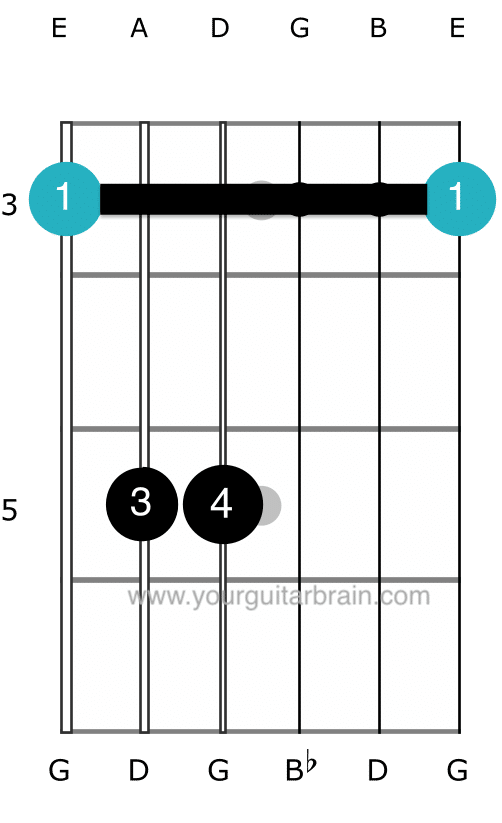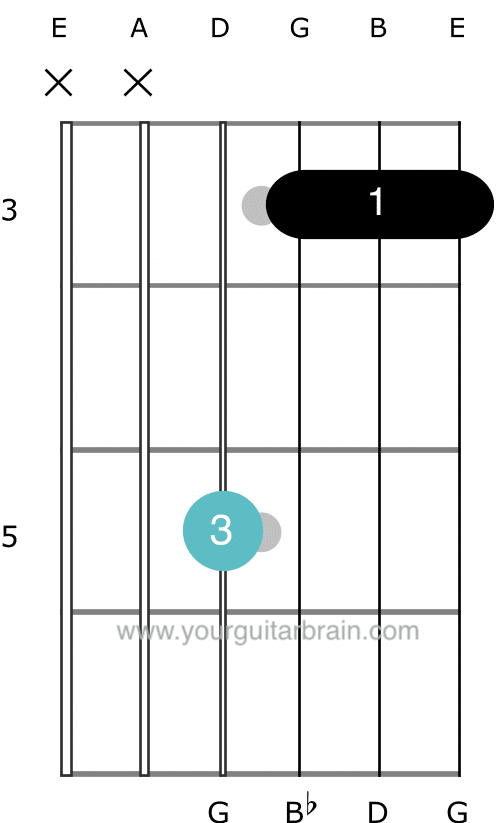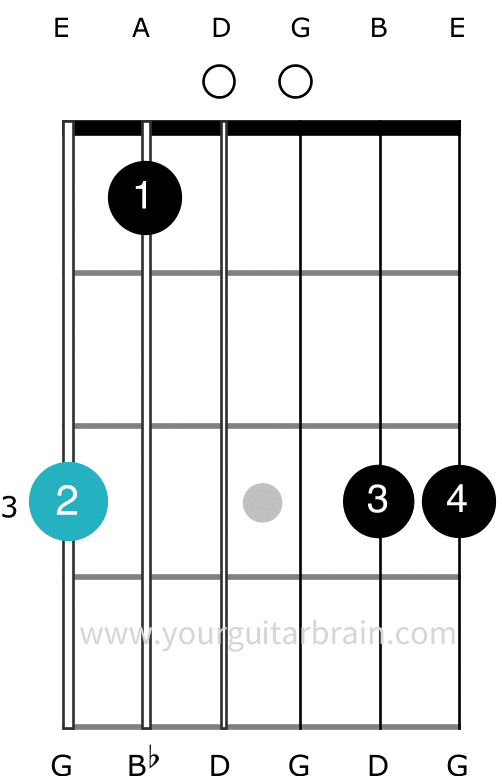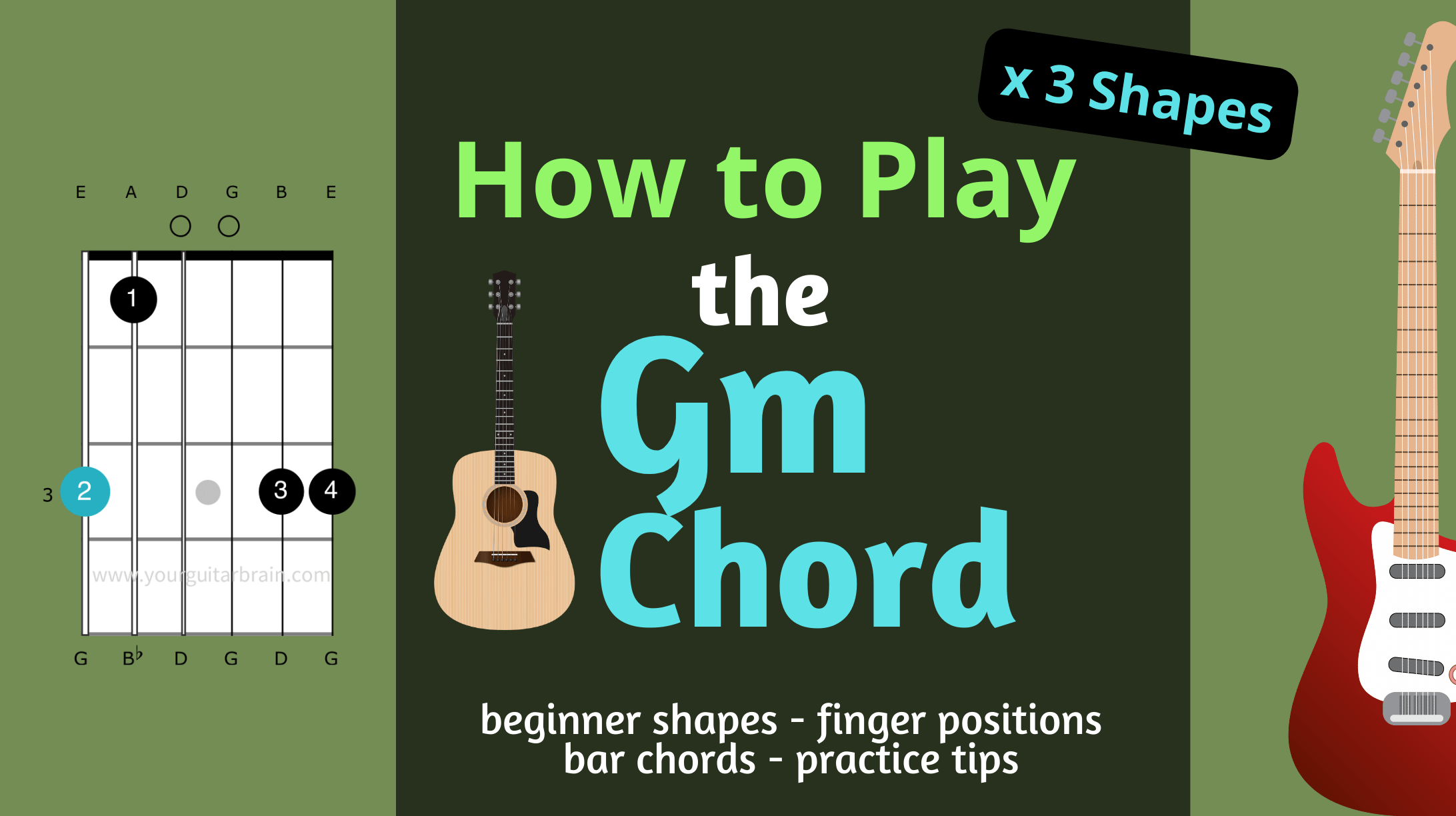G minor chord time! Learn how to play Gm on guitar, from easy beginner chord shapes to popular bar chords. Check out the easy-to-read large chord charts with finger positions. 🎸
Learning the G minor chord on guitar opens the door to countless easy guitar songs. In this guide, we’ll explore three beginner-friendly ways to play the Gm chord, from basic shapes to simple bar chords.
Whether you’re just starting out or looking to expand your chord repertoire, this tutorial will show you how to learn the G minor chord on guitar with ease.
Let’s get going! 🙌
G Minor Chord Names
G minor | Gm | G min | G minor triad
G Minor Chord Sound
The G minor chord consists of three notes: G, Bb, and D. Think of G as the home base; it’s the root note. Bb steps in as the minor third, giving the chord its distinctive somber tone. Then D comes along as the perfect fifth, rounding out the chord.
Like all minor chords, the Gm guitar chord is the sound of life’s ups and downs, all wrapped up in those three little notes.
G Minor Chord Theory Facts
- The G minor chord contains the notes: G – B♭ – D. These notes repeat all over the guitar fretboard, we can, therefore, play Gm using a variety of different shapes and voicings.
- G minor chord is made up of notes taken from the G minor scale. Notably, the 1st (root), flat third (♭3), and 5th (perfect fifth).
- The G minor chord interval formula is 1 – ♭3 – 5.
- If we describe a song as being “in the key of G minor,” the first chord (aka the tonic) in the key signature is Gm.
Chords in the Key of G Minor:
- i: G minor
- ii°: A diminished
- III: Bb major
- iv: C minor
- v: D minor
- VI: Eb major
- VII: F major
G Minor Chord Progressions:
- Gm (i) – Bb (III) – F (VII) – Eb (VI)
- Gm (i) – Cm (iv) – D7 (V7) – Gm (i)
- Gm (i) – Eb (VI) – Bb (III) – F (VII)
- Gm (i) – F (VII) – Eb (VI) – D7 (V7)
Good to Know
The chord diagrams below show the best fingerings in the finger position circles. The chord notes are shown below the boxes with the G root highlighted in blue.
Shape 1 – Gm Bar Chord Shape
Before we get to the easy Gm beginner chord shape, let’s look at the full Gm bar chord, which is one of the most common ways to play G minor on the guitar.
This chord shape is made by taking the familiar open E minor chord shape and sliding it up the fretboard a bit. Then, you lay your index finger flat across all the strings at the third fret to create the bar, forming the Gm chord.
We call this C minor bar (or barre) chord shape the “E shape” because we base it on an open E minor chord shape.

G minor bar chord – “E shape”
In this G minor chord, the G root note is on the 3rd fret of the low E (6th) string. Just like all minor chords, the Gm chord is a songwriter’s secret sauce for stirring up emotions ranging from melancholy to wistfulness to heartache.
Here are the finger positions for the Gm bar chord:
- First (index) finger – 3rd fret of the low E (6th) string and bar across all six strings (6-1)
- Third (ring) finger – 5th fret of the A (5th) string
- Pinky (fourth) finger – 5th fret of the D (4th) string
Pro Tip
This chord shape can be difficult to play cleanly, so here's a tip; use your middle (2nd) finger to squidge down and apply extra pressure on top of your 1st finger.
Shape 2 – G minor Chord Partial Bar
For beginner guitar players, mastering the bar chord technique can be tough going. But don’t worry, there are easier ways to play the Gm chord whilst you build up your finger strength!
In this simplified version, you only need to place your index finger on the third fret of the first three strings (E, B, & G), and then place your 3rd finger on the fifth fret of the 4th string (D).
Just be careful not to strum the Low E and A strings while playing this chord version; otherwise, the chord will sound muddy.

Simpler Gm chord
Here are the finger positions:
- First (index) finger – press flat and form a bar across the top 3 strings on the 3rd fret
- Third (ring) finger – 5th fret of the D (4th) string
This Gm chord voicing might not be the no 1. easy beginner guitar chord shape, but it’s a stepping stone to mastering full bar chords! Just remember, patient practice makes perfect, and soon you’ll be nailing these chords with clear, ringing tones.
Shape 3 – Easy Gm Chord for Beginners
Here’s an easier Gm chord that’s perfect for beginners. If you’ve got the major G chord down (which is a must-know), transitioning to this Gm version isn’t a big stretch. Dare I say it’s easy? There, I just did, so it’s official!
To play this G minor chord, play the open G major chord and just shift your first finger down one fret to hit the flat third note on the first fret of the A string.

Beginner Gm chord
Finger placements:
- First (index) finger – 1st fret of the A (5th) string
- Second (middle) finger – 3rd fret of the bottom E string
- Third (ring) finger – 3rd fret of the B (2nd) string
- Pinky (fourth) – 3rd fret of the top E (1st) string
Yes, this Gm shape is the easiest on our list, but let’s not sugarcoat it: mastering this Gm chord takes practice. And what I mean by “easy” varies depending on your skill level.
If you’re a confident beginner, you’ll find it a breeze. But if you’re just starting out, it will be a trickier.
If you haven’t yet nailed the essential basic beginner chords, focus on them before attempting this G chord. This bad boy can wait until you’re ready.
3 Tips to Play the Gm Chord Clean
Here are some helpful techniques to enhance your Gm chord on your guitar. The best part? You can apply these strategies to all the chords you’re working on.
1. Thumb position
Struggling with the Gm bar chord shapes? Let’s start by adjusting your fretting hand thumb position. A good rule of thumb (pun intended!) is to place your thumb in the middle of the back of the neck, aligning it with your 2nd finger on the fretboard.
Take the 6th string root Gm bar chord, for instance. Position your thumb beneath fret 4 (in the middle of the chord span).
Placing your thumb here makes it easier to stretch your fingers and play the chord cleanly without mutes and nasty buzzes.
2. Isolate it
Worried about your chords to the point you freak out at the thought of playing your guitar in front of others? Boost your confidence by ensuring your chords ring out clearly.
Remember, it’s not about speed; it’s about clarity. When working on the Gm chord, if you pick a string and it buzzes, pause.
Find the culprit and give it some solo attention. Press down on that string, just by itself, and alternate pick on the note until it sings out nice and clear. Rinse and repeat. That’s the way to build up to a perfect chord.
3. Gm chord progressions
Mastering chord changes is key. Here are three common chord progressions featuring the Gm chord. Begin with one strum per chord and gradually introduce strumming patterns as you become more comfortable:
- Gm (i) – D7 (V7)
- Gm (i) – Cm (iv) – D (V)
- Gm (i) – Eb (VI) – F (VII)









